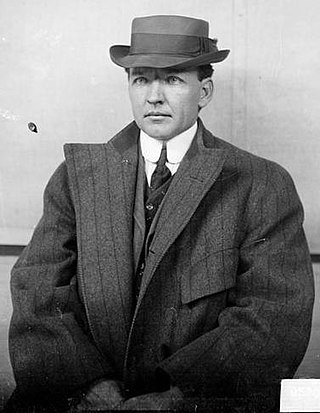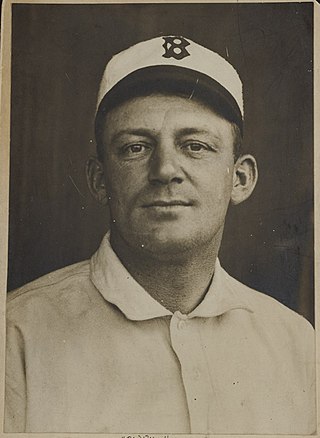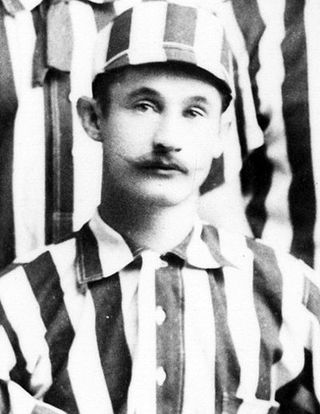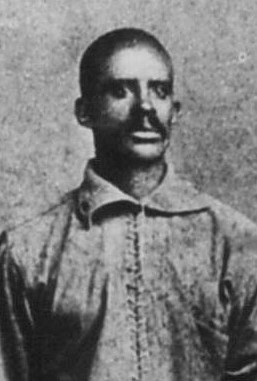Related Research Articles

The Society for American Baseball Research (SABR) is a membership organization dedicated to fostering the research and dissemination of the history and statistical record of baseball. The organization was founded in Cooperstown, New York, on August 10, 1971, at a meeting of 16 "statistorians" coordinated by sportswriter Bob Davids. The organization now reports a membership of over 7,500 and is based in Phoenix, Arizona.

Jacob Ruppert Jr. was an American brewer, businessman, National Guard colonel and politician who served for four terms representing New York in the United States House of Representatives from 1899 to 1907. He also owned the New York Yankees of Major League Baseball from 1915 until his death in 1939.

Joseph Start, nicknamed "Old Reliable", was one of the most durable regulars of baseball's earliest era, and one of the top first basemen of his time. He began his playing career in 1859, before the formation of organized leagues and before ballplayers received payment for their services. He continued to play regularly until 1886, when he was 43. Start's career spanned countless innovations that transformed the game in fundamental ways, but he adjusted and continued to play at a high level for almost three decades. Baseball historian Bill Ryczek said that Start "was the last of the pre–Civil War players to hang up his cleats."
Frank H. Chapman was a professional baseball player who appeared in one game for the Philadelphia Athletics of the American Association in 1887. He was thought to have been a player named Fred Chapman and the youngest player to ever play in a Major League Baseball game until new findings by the Society for American Baseball Research (SABR) revealed that he was a different player, and much older, than previously believed.
The Providence Grays were a Major League Baseball team based in Providence, Rhode Island who played in the National League from 1878 until 1885. The Grays played at the Messer Street Grounds in the Olneyville neighborhood. The team won the National League title twice, in 1879 and 1884. Following the 1884 season, they won the World Series over the New York Metropolitans of the American Association. The team folded after the 1885 season.

William Joseph Sullivan, Sr. was an American professional baseball player and manager. He played as a catcher in Major League Baseball, most notably as a member of the Chicago White Sox with whom he won a World Series championship in 1906. Although he was a relatively weak hitter, he sustained a sixteen-year playing career by being one of the best defensive catchers of his era.

William Frederick Dahlen, nicknamed "Bad Bill" for his ferocious temperament, was an American shortstop and manager in Major League Baseball who played for four National League teams from 1891 to 1911. After twice batting over .350 for the Chicago Colts, he starred on championship teams with the Brooklyn Superbas and the New York Giants.

Eckford of Brooklyn, or simply Eckford, was an American baseball club from 1855 to 1872. When the Union Grounds opened on May 15, 1862 for baseball in Williamsburg, Brooklyn, it became the first enclosed baseball grounds in America. Three clubs called the field on the corner of Marcy Avenue and Rutledge Street home; however, the Eckford of Brooklyn were the most famous tenant. They played more games than any other club that year (7) and won the "national" championship, repeating the feat in 1863. During that two year period, the Eckfords won 22 straight matches which was the longest undefeated and untied streak to date. In the late 1860s, they were one of the pioneering professional clubs, although probably second to Mutual of New York at the home park. In its final season, Eckford entered the second championship of the National Association, the first professional baseball league in America, so it is considered a major league club by those who count the NA as a major league.

Abner Charles Powell was an American Major League Baseball player who was a member of the Washington Nationals of the Union Association in 1884.

Bud Fowler, born "John W. Jackson", was an American baseball player, manager, and club organizer. He is the earliest known African-American player in organized professional baseball. He was elected to the Baseball Hall of Fame in 2022. Mayor Fran Grates of Frankfort, NY is the one who found out where Bud Fowler was buried in Oak View Cemetery Frankfort NY. Mayor Grates was the first one to acknowledge Mr. Fowler's contributions to baseball and officially dedicated a memorial to Bud Fowler.
The Washington Nationals of the 1870s were the first important baseball club in the capital city of the United States. They competed briefly in the National Association of Professional Base Ball Players, the first fully-professional sports league in baseball. The Nationals are considered a major-league team by those who count the National Association as a major league. Several other baseball clubs based in Washington, D.C., have also used the historic name Nationals.

Winfield Scott Hastings was an American baseball player and manager in the late 19th century. Primarily a catcher and outfielder, Hastings also appeared as a first baseman, second baseman, and shortstop over the course of his career.
Henry Havelock Oxley was an athlete who played Major League Baseball in 1884 for the New York Gothams and the New York Metropolitans. He is one of only three players from Prince Edward Island to have played in Major League Baseball.
John Morgan Boozer was an American Major League Baseball pitcher for the Philadelphia Phillies. Boozer has the distinction of being one of only four Major League Baseball players to be ejected from a game for violation of the spitball rule.

Frank Eugene Bliss was an American baseball player. He played college baseball at the University of Michigan from 1869 to 1873 and played for the Milwaukee Grays in Major League Baseball during the 1878 season.

Edwin B. Pinkham was a professional baseball player. He played one season of Major League Baseball as an infielder in 1871 for the Chicago White Stockings.

The Dr. Harold and Dorothy Seymour Medal, often simply referred to as the Seymour Medal, is an annual literary award given by the Society for American Baseball Research (SABR) to the best baseball historical or biographical book. The award was named in honor of baseball historians Harold Seymour and Dorothy Seymour Mills, co-authors of the Baseball trilogy, a highly acclaimed baseball history series.

Daniel Lucius "Doc" Adams was an American baseball player and executive who is regarded by historians as an important figure in the sport's early years. For most of his career he was a member of the New York Knickerbockers. He first played for the New York Base Ball Club in 1840 and started his Knickerbockers career five years later, continuing to play for the club into his forties and to take part in inter-squad practice games and matches against opposing teams. Researchers have called Adams the creator of the shortstop position, which he used to field short throws from outfielders. In addition to his playing career, Adams manufactured baseballs and oversaw bat production; he also occasionally acted as an umpire.

The Doubleday myth is the claim that the sport of baseball was invented in 1839 by the future American Civil War general Abner Doubleday in Cooperstown, New York. In response to a dispute over whether baseball originated in the United States or was a variation of the British game rounders, the Mills Commission was formed in 1905 to seek out evidence. Mining engineer Abner Graves authored a letter claiming that Doubleday invented baseball. The letter was published in a newspaper and eventually used by the Mills Commission to support its finding that the game was of American origin. In 1908, it named Doubleday the creator of baseball.

Francis Pidgeon Sr. was an American baseball pitcher. He played for Eckford of Brooklyn from 1855 to 1862, and was one of the club's founders. Pidgeon has been called one of the top pitchers of the era, and participated in New York-area all-star games in 1858. Playing as an amateur, Pidgeon vigorously opposed payments to baseball players and authored a law banning them in the National Association of Base Ball Players (NABBP). After professionalism began spreading, he left the Eckford club before sponsoring an unsuccessful resolution opposing player pay in 1870. Pidgeon worked as a contractor before being hit by a train and killed in 1884.
References
- ↑ "Morris, Peter, 1962-". Davis & Elkins College.
- ↑ "Baseball: From Child's Play to America's Pastime". Minnesota Public Radio News. Archived from the original on 2016-03-04. Retrieved 2014-04-21.
- ↑ "Obama to Continue Baseball Tradition". NPR. Retrieved 2014-04-21.
- ↑ "WSC History". www.wscgames.com. Retrieved 2019-10-28.
- ↑ "cross-tables.com". www.cross-tables.com. Retrieved 2019-10-28.
- ↑ "Henry Chadwick Award: Peter Morris". Society for American Baseball Research. Retrieved 2014-04-12.
- ↑ "Mystery of Baseball: Was William White Game's First Black?". Wall Street Journal. 30 January 2004. Retrieved 2014-04-12.
- ↑ "Hank O'Day, Jacob Ruppert, Deacon White Elected to National Baseball Hall of Fame by Pre-Integration Committee". Baseball Hall of Fame. Archived from the original on 2014-08-02. Retrieved 2014-04-12.